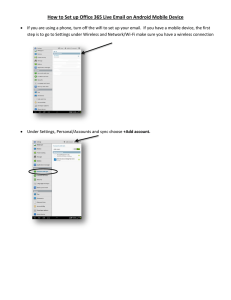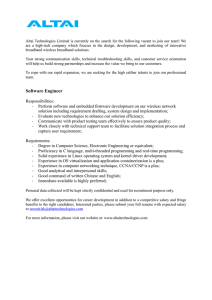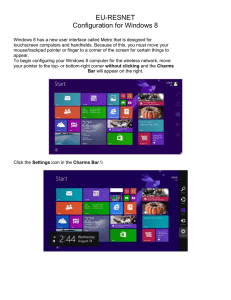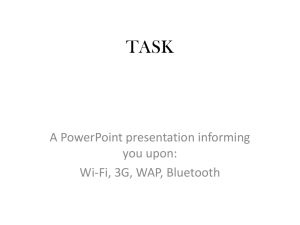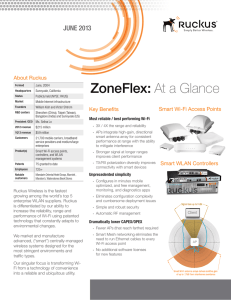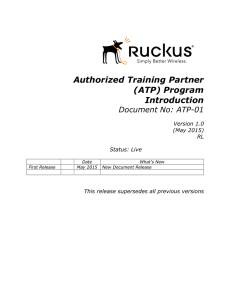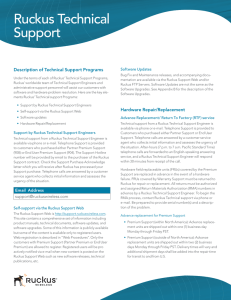white paper Educators Get Smart About Telecom
advertisement
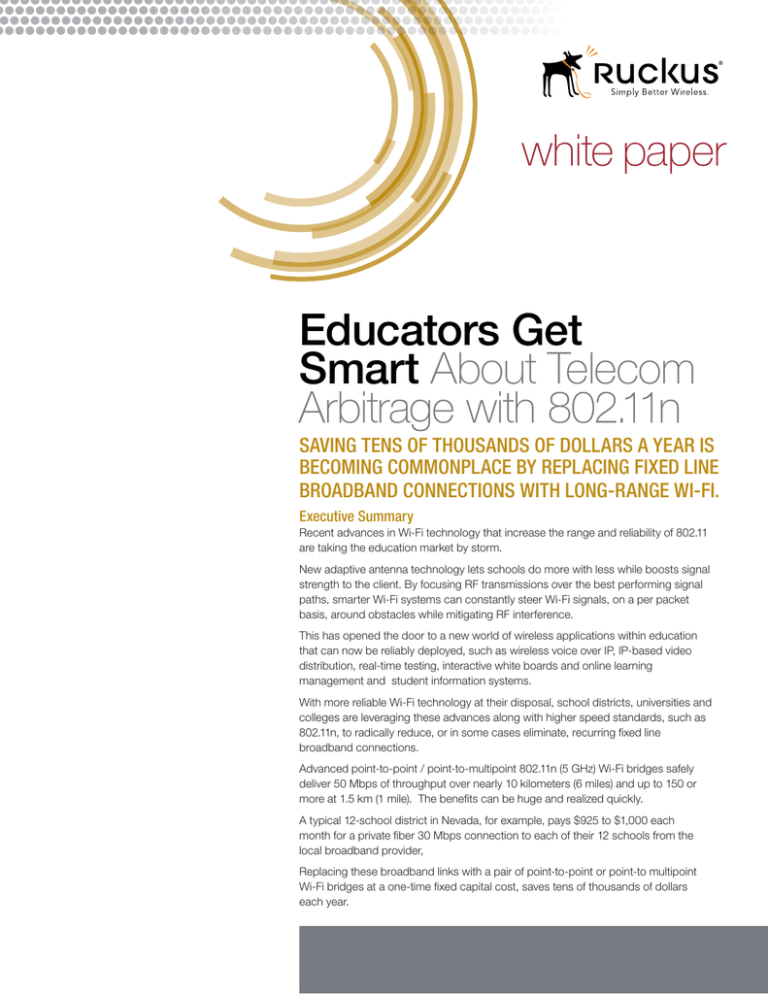
white paper Educators Get Smart About Telecom Arbitrage with 802.11n Saving tens of thousands of dollars a year is becoming commonplace by replacing fixed line broadband connections with long-range Wi-Fi. Executive Summary Recent advances in Wi-Fi technology that increase the range and reliability of 802.11 are taking the education market by storm. New adaptive antenna technology lets schools do more with less while boosts signal strength to the client. By focusing RF transmissions over the best performing signal paths, smarter Wi-Fi systems can constantly steer Wi-Fi signals, on a per packet basis, around obstacles while mitigating RF interference. This has opened the door to a new world of wireless applications within education that can now be reliably deployed, such as wireless voice over IP, IP-based video distribution, real-time testing, interactive white boards and online learning management and student information systems. With more reliable Wi-Fi technology at their disposal, school districts, universities and colleges are leveraging these advances along with higher speed standards, such as 802.11n, to radically reduce, or in some cases eliminate, recurring fixed line broadband connections. Advanced point-to-point / point-to-multipoint 802.11n (5 GHz) Wi-Fi bridges safely deliver 50 Mbps of throughput over nearly 10 kilometers (6 miles) and up to 150 or more at 1.5 km (1 mile). The benefits can be huge and realized quickly. A typical 12-school district in Nevada, for example, pays $925 to $1,000 each month for a private fiber 30 Mbps connection to each of their 12 schools from the local broadband provider, Replacing these broadband links with a pair of point-to-point or point-to multipoint Wi-Fi bridges at a one-time fixed capital cost, saves tens of thousands of dollars each year. Educators Get Smart About Telecom Arbitrage with 802.11n Saving tens of thousands of dollars a year is becoming commonplace by replacing fixed line broadband connections with long-range Wi-Fi. FIGURE 1: Considering the alternatives (based on real customer data) School School School FIXED LINES $925/month (per line) 30Mbps dedicated fiber connections Telco District Office $2,400 one-time equipment costs for 50-100 Mbps over distances from 1 to 6 miles WIRELESS School School The Cost Problem OPEX and CAPX Deploying a new IT infrastructure or services is an issue for resource-challenged schools districts. It takes money and man-hours to research, roll-out, and maintain these bigger and better technologies. IT administrators address this by saving as much money as possible while developing creative ways to solve IT issues. In order to decrease operational expenditures, the IT department is expected to rein in ongoing costs in order to abide by their school district’s budgetary constraints. In this same vein, capital expenditures — doing more with less equipment — is also at the front if the IT administrator’s mind. Particularly when faced with short-term budgetary constraints, it is more important than ever to accomplish more with less equipment and/or service costs. School FIGURE 2: The typical school district in the US (with 5 schools on average) can save from $37K to $163K over three years Typical 5 link school on average improved per link economics from approximately $40k to $160k over 3 years. School School District Office Telco Traditional School District Networks Wireless or wired networking is here to stay in education — or any enterprise for that matter. But as any IT manager in education knows, school districts traditionally use Hub and Spoke network topologies to move traffic from the district office to the other district schools. Ongoing costs are high with this architecture where the service provider charges on a monthly basis. Depending on the bandwidth SLA for each dedicated school connection from the district office and the carrier, costs linking each school can vary from $300/month to $1,000/month in perpetual ongoing costs. (See Figure 1) page 2 School School School Educators Get Smart About Telecom Arbitrage with 802.11n Saving tens of thousands of dollars a year is becoming commonplace by replacing fixed line broadband connections with long-range Wi-Fi. TABLE 1 Compelling economics for bridges versus dedicated Telco links Single Link Costs Connectivity Onetime Telco Dedicated Link Ruckus Wireless Bridge $2.4k Comparison Ongoing* Total First Year Costs Total 3 Year Costs $300–$1k $3.6k–$12k $10.8k–$36k $28 $2.7k $3.4k $900–$9k $7k–$33k Savings with Ruckus *Annual maintenance costs broken out monthly for bridges. Telco costs vary by geography and carrier. The Cost Solution Next Steps Replacing your service provider’s dedicated links from the district office with a wireless point to point bridge can save significant cost. A bridge is owned outright thus incurring no monthly charges. The break even time period of replacing a dedicated link with a bridge pair in lieu of dedicated broadband — including installation, is 12 months (conservatively assuming each dedicated link costs $300 per month). Moving forward, this translates into a savings of more than $3,000 per school. Over a three year period, assuming the district has 15 schools, replacing a $300 per school carrier contract with a wireless bridge would save approximately $100,000. Contact a Ruckus VAR to evaluate your school and to see whether it would be a good candidate for this cost saving solution. After all, Ruckus products have the best capacity (especially in dense schoolroom settings) and excellent range, so you do not need as much equipment. Less equipment, in turn, further lowers your OPEX as you will have fewer expenses for support and maintenance. Copyright © 2013, Ruckus Wireless, Inc. All rights reserved. Ruckus Wireless and Ruckus Wireless design are registered in the U.S. Patent and Trademark Office. Ruckus Wireless, the Ruckus Wireless logo, BeamFlex, ZoneFlex, MediaFlex, FlexMaster, ZoneDirector, SpeedFlex, SmartCast, SmartCell, ChannelFly and Dynamic PSK are trademarks of Ruckus Wireless, Inc. in the United States and other countries. All other trademarks mentioned in this document or website are the property of their respective owners. 803-71274-001 rev 01 Ruckus Wireless, Inc. 350 West Java Drive Sunnyvale, CA 94089 USA (650) 265-4200 Ph \ (408) 738-2065 Fx Consider point to point bridges to connect your school campuses and recoup your up-front costs in one year or less! www.ruckuswireless.com
